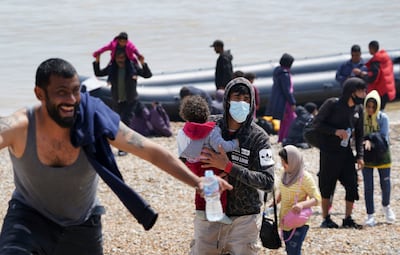The number of migrants crossing the English Channel in small boats this year has passed the total for 2020 as the UK government promises action after striking a deal with France to tackle the problem.
After 287 migrants landed on UK shores on Tuesday, it brought this year's total to have made the journey across the world's busiest shipping lane to at least 8,452, Britain's Home Office said.
The figure eclipses the number for the whole of 2020, when a record 8,417 crossed the Channel in dinghies and small boats.
On Monday, at least 430 migrants crossed the Channel – a record for a single day. The previous daily high of 416 was set in September last year.
UK Home Secretary Priti Patel and her French counterpart Gerald Darmanin agreed to reinforce co-operation to target people smugglers.
The UK will spend more than £54 million ($73m) to help France stem the flow of illegal migrants crossing the Channel. This includes "beefing up security forces along the coast", the French Interior Ministry said.
Growing numbers of migrants – many of them on dangerously overcrowded inflatable boats – have reached the UK since the start of 2020.
The number of crossings typically increases in favourable summer weather.
The Home Office said UK support last year helped France to double the number of officers stationed on the beaches of its north coast.
However, it said migrants were now taking "even longer, riskier journeys" after people smugglers changed their tactics and moved farther east along the French coast.
The new support announced by the UK will enable France "to respond by posting more security forces further up the coast, installing and utilising the latest surveillance equipment throughout northern France", the Home Office said.
Home Office Minister Victoria Atkins on Wednesday said the deal would help "control the flow [of migrants] coming over to us".
"We’re trying to ensure we have an immigration system that is firm, fair and opening up safe routes for people to come legally but also cracking down on the criminal gangs who are exploiting people’s wishes to come to the UK," she told Sky News.
But Ms Patel came under fire from MPs on Wednesday who accused her of “throwing good money after bad” by signing the French deal. The UK had already paid £114m to France since 2015 for extra security measures on the northern French coastline.
But officials said France had trebled the number of interceptions of migrant boats in the first six months of the year, 6,000, compared with the previous period last year when 2,100 were stopped.
Ms Patel said she was continuing to examine options including sending migrant vessels intercepted in British waters back to France.
Human rights groups have monitored the tactics off the Greek coastline where coastguards were accused of breaking international law by blocking migrant boats from its coastline and returning them to Turkish waters.
"We have absolutely been looking at what we can do at sea in terms of maritime tactics all within the legal framework … of saving lives at sea and international maritime law," Ms Patel said.
Dan O'Mahoney, the government's clandestine Channel threat commander, called the increase in crossings unacceptable and dangerous.
"People should claim asylum in the first safe country they reach and not risk their lives making these dangerous crossings," he said.
"We are continuing to pursue the criminals behind these illegal crossings."

Among the arrivals on Monday was a family-of-six from Kuwait who said they paid thousands of pounds to travel from France to England in a small boat. They said they could not swim.
“There are six of us, four children. We have come from Kuwait originally but have been in France for the last month. We paid £8,000 to come here,” the father told the Daily Mail.
Most of the crossings start in France and the two governments have been at loggerheads over who should take responsibility for stopping them.
Mr O'Mahoney said the government's Nationality and Borders Bill would "protect lives and break this cycle of illegal crossings".
The legislation increases the maximum sentence for migrants entering the UK unlawfully from six months to four years. Convicted people-smugglers would face a life sentence.
But Pierre-Henri Dumont, a French MP for the Calais region, doubted that increased police patrols would deter the crossings, given the length of the French coastline.
"The shore of the French coast is very difficult to monitor because they [migrants] can hide in different places," he told the BBC's Radio 4 Today programme.
"Even if you are monitoring a small or large part of the French coast, the smugglers will find a place to cross. If it’s not in Calais, it will be Normandy. If it’s not Normandy, they will go to Belgium. If they are not going to Belgium, they will go to the Netherlands."
Former Border Force director-general Tony Smith agreed that the deal with the French would not alone solve the problem, but he said the measure would help authorities to gain an advantage in what he called "the game of cat and mouse" with people smugglers.
"It’s pretty clear smuggling gangs have a lot of resources ... they are moving migrants along the coast," he said.
"By providing the French with more resources, more patrols and more technology to track and trace, it provides more opportunity to prevent these crossings and save lives."
Bella Sankey, director of charity Detention Action, said the crossings underlined Britain's failure to create a "safe and fair asylum system".
“Priti Patel can reannounce enhanced police co-operation with the French all day, every day, but until there is a political renegotiation to allow refugees safe passage to claim asylum at the UK border in France, this relatively small number of desperate people will continue risking everything for a shot at our protection," she said.
“Ministers should stop playing fantasy politics and step up to protect lives instead.”








